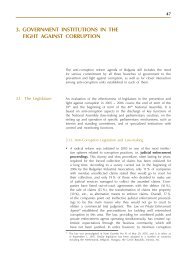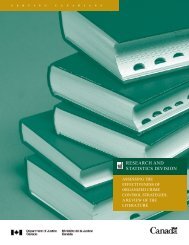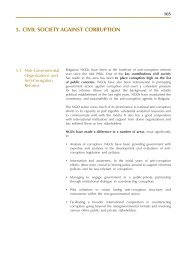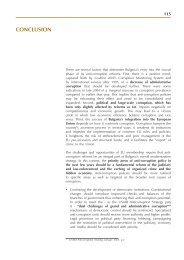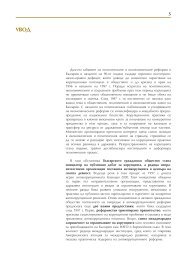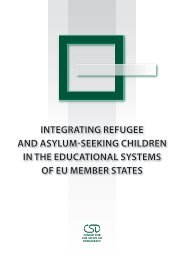National Threat Assessment 2008. Organised Crime - Politie
National Threat Assessment 2008. Organised Crime - Politie
National Threat Assessment 2008. Organised Crime - Politie
You also want an ePaper? Increase the reach of your titles
YUMPU automatically turns print PDFs into web optimized ePapers that Google loves.
injured or killed because too many risks are taken during the smuggling process.<br />
Smuggling of illegal immigrants also increases costs in a number of economic<br />
sectors. Transhipment companies, for example, have to employ stricter security<br />
measures at their sites to prevent people from climbing into their lorries. Goods<br />
transport also takes longer due to border checks. Companies in the tourist sector<br />
are also subject to economic dangers. The government may hold transport<br />
companies liable if they transport aliens without the necessary documents.<br />
Comprehensive pre-boarding checks are therefore carried out in certain high-risk<br />
countries. However, it should also be noted that smuggling of illegal immigrants<br />
may reduce costs for sectors in which illegal aliens can be used as cheap workers<br />
(e.g. in a sowing shop or a shrimp-peeling mill).<br />
Examples of (financial) harm suffered by society as a whole include misuse<br />
of certain regulations such as the Approved Destination Status Agreement,<br />
student visas and the asylum procedure.<br />
2.7.6 <strong>Crime</strong>-related factors and expectations<br />
The market regarding the smuggling of illegal immigrants is influenced by<br />
push and pull factors such as national (international) migration policies, ecology,<br />
economic developments and areas of conflict throughout the world. However,<br />
the exact relationship between these factors and smuggling of illegal immigrants<br />
to or via the Netherlands is unclear. One conclusion that can be drawn is that<br />
changes to the policy of the Dutch government may affect the scale of<br />
smuggling operations. The European Union’s policy with regard to its external<br />
borders and the accession of new member states is also important, as this<br />
accession has extended the eastern external borders of the European Union to<br />
the Baltic states, Poland, Slovakia, Hungary and Slovenia and these countries<br />
have borders that are difficult to monitor. In addition, anyone who crosses the<br />
external borders into the Schengen area is free to travel anywhere within that<br />
area, which is why these countries are being trained by the EU in the<br />
performance of their new task. The next few years will show whether human<br />
smugglers start using the new external borders of the EU and change their<br />
smuggling routes accordingly.<br />
There are no indications of the development of new working methods for<br />
smuggling of illegal immigrants in the near future. No major changes are<br />
expected either within the logistics of human smuggling. The same roles,<br />
such as organiser, local guide, driver and money launderer, will remain relevant.<br />
False and falsified passports will remain an essential tool, as they make many<br />
different ways of legal travel possible.<br />
chapter 2 – Illegal markets<br />
79



